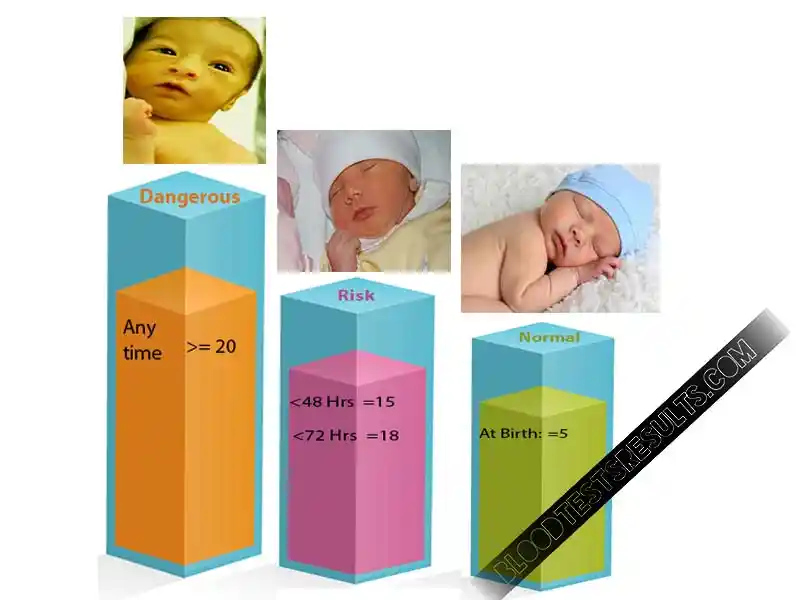Updated: Jaundice Levels Chart in Newborns (Jaundice Levels 5,12,15,18,20,30 explained)
Jaundice levels chart is to know the normal Jaundice Levels in newborn infants, the risk jaundice levels that need treatment for the newborn baby, and the new guidelines for effective treatment and fasts getting rid of jaundice.
Jaundice has another medical term “icterus” and means a yellowish tinge to the skin and the white part of the eye (sclera) that is caused by an excess of bilirubin in the blood, which is called in medicine hyperbilirubinemia.
Serum indirect bilirubin level is the most common elevated bilirubin in newborns, high direct bilirubin in newborn infants seen in rare conditions of biliary atresia which requires surgical intervention to prevent any liver damage to the child, and in neonatal hepatitis.
Risky Jaundice levels:
The normal total bilirubin level is any value from 0.3 to 1.0 mg/dL. In a newborn, due to less mature liver function and absence of microorganisms (both are processing bilirubin), normal bilirubin level in a newborn under 5 mg/dL, then go higher in many newborns, the infant bilirubin levels usually fall substantially by day 7, the bilirubin risk level in newborns are more than 15 mg/dL before 48 hours old, more than 18 mg/dL before 72 hours old, more than 20 mg/dL anytime for both healthy born or preterm delivery).

Why do Newborns children have jaundice and high bilirubin?
High indirect bilirubin in newborns is a result of accelerated RBCs breakdown due to:
- Blood type incompatibility between the mother and her newborn, recommended for Blood film examination to observe hemoglobin level, NRBCs and reticulocyte count.
- Lack of oxygen (hypoxia), Arterial blood gases test is recommended.
- Diseases that can affect the liver, liver function tests are recommended.
- Certain congenital infections.
Hyperbilirubinemia risk levels in infants:
- Lower Risk: More than or equal to 38 weeks and well, recommended to evaluate for phototherapy and check TSB in 4-24 hours.
- Medium Risk: More than or equal to 38 weeks and hyperbili risk factors OR 35 to 37 6/7 weeks and well, recommended to evaluate for phototherapy and check TSB in 4-24 hours.
- Higher Risk: 35 to 37 6/7 weeks and hyperbili risk factors, recommended to evaluate for phototherapy and check TSB in 4-24 hours.
Who is at risk of high bilirubin levels?
Hyperbilirubinemia Risk Factors are:
- TSB/TcB in high-risk zone
- Jaundice in the first 24 hours
- ABO incompatibility with positive direct Coomb’s test, known hemolytic disease, or elevated ETCO.
- Gestational age 35-36 weeks
- Prior sibling had phototherapy
- Cephalohematoma or bruising
- Exclusive breastfeeding, esp. with poor feeding or weight loss
- East Asian Race
Neurotoxicity Risk Factors
Neurotoxicity level is the bilirubin level at which brain damage is expected.
- Isoimmune Hemolytic Disease
- G6PD deficiency, G6PD test is needed with CBC test.
- Asphyxia
- Significant lethargy
- Temperature instability
- Sepsis, recommended for blood culture and PCR test for specific microbes.
- Acidosis, observed through ABG test and serum electrolytes test.
- Albumin less than 3.0 g/dL
How to get rid of jaundice in newborn babies?
According to AAP Phototherapy Guidelines (2004)
- Lower Neurotoxicity Risk Level is when baby born at more than or equal to 38 weeks and well, doesn’t need to start phototherapy until reaches an approximate threshold 11.7 mg/dl at 24 hours of age.
- Medium Neurotoxicity Risk Level is when baby born at 38 weeks with neurotoxicity risk factors OR 35 to 37 6/7 weeks and well, start phototherapy when reaches approximate threshold 9.9 mg/dl at 24 hours of age.
- Higher Neurotoxicity Risk Level is when baby born 35 to 37 6/7 weeks and neurotoxicity risk factors, bilirubin level reaches an approximate threshold 8 mg/dl at 24 hours of age, recommended to start phototherapy.
Which bilirubin level needs incubator phototherapy or at home?
- Home phototherapy is effective when TSB levels 2-3 mg/dl (35-50 µmol/L), or when there are no risk factors with elevated bilirubin levels in normal born babies.
- Hospital phototherapy at a specialized incubator are more recommended than the home therapy solutions especially with those preterm newborns with risk factors.
Please read the previous explanation about normal newborn bilirubin levels.
If you got any help please share the knowledge, welcome to your question.